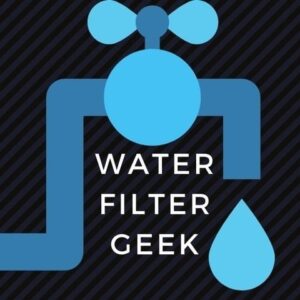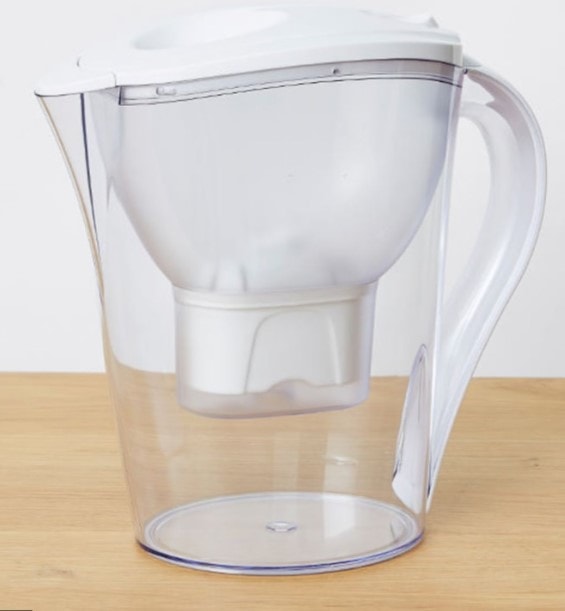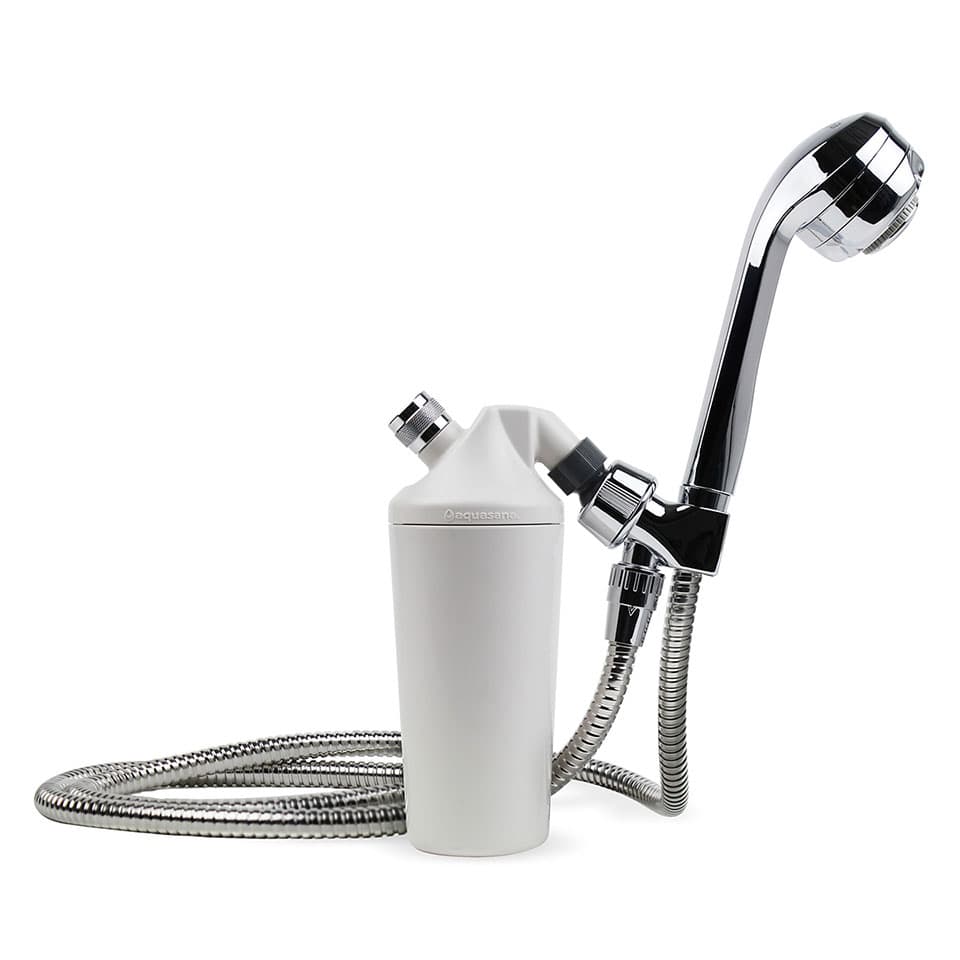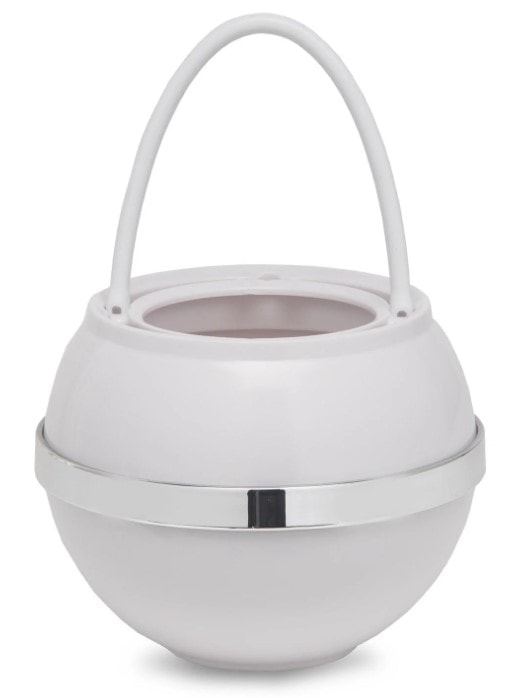Choosing a water filter for your home can be overwhelming, I am here to give you some easy insight and a quick guide into what will be useful!
I’ve had a strange passion for water, especially filtered water since I was very young. I like to think water is life, literally.
I’ve used and bought a complete range of water filters, and I’ve worked with plumbing companies that supply filtration and renewable solutions for residential and commercial solutions.
Because of the extensive amount of products on the market, the goal of this article will be to help you simply and hopefully in the most useful way, let’s go.
Now there is a government website page I read through here, it just didn’t really give a simple answer. That is the main reason why I wrote this article. You don’t need to wade through a government site, the information summarized is here.
The most useful quote from that, in my opinion, was this:
Some filters are slow, while others can filter large amounts of water quickly. If you only need the filter for personal drinking water, you may not need a fast filter.
CDC – Choosing Home Water Filters
How do I Know Which Water Filter to use?
If you want a self-installed water filter choose a jug, faucet, countertop, or under-sink water filter. For whole house water filtration, you will need to involve a plumber. Shower and bath water filters are designed to remove chlorine and very often can be self-installed.
An easy and simple way to choose filters is – for the kitchen it will filter for drinking. For shower and bath it will be designed around chlorine and other impurities you don’t want to soak on your skin.
For a whole house filter, it can be either complete removal of all impurities and minerals (Reverse Osmosis) or a Stage Filtered System, which can often be customized to your need, a plumber is needed for this to give you accurate advice.
The easiest option, which I recommend to most people is a faucet water filter, it screws onto the kitchen tap/faucet and you can switch between filtered and non-filtered water.
Because of the simplicity, and long life, (2,000 Gallon) which lasts up to 12 months. My favorite faucet filter is this crystal quest 6-stage filter, which you will install onto your kitchen faucet in less than 5 minutes.
Now here are the above-mentioned types with a picture and explanation of each including benefits and drawbacks.
For the most useful advice, do not get caught up in the technology too much, rather look at the end result. Any of the suggested water filters on this site will get the results.
The goal is to make this simple and direct you to a solution that doesn’t take days of research! In other words, useful content!
How Do I Choose a Water Filter for My Home
If you go to a water filter shop or online site and instantly get overwhelmed, here is the simplest explanation I can come up with.
Here are the main types of water filters for your home and (easy-to-digest) details about them to figure out which area you want the water filtered in:
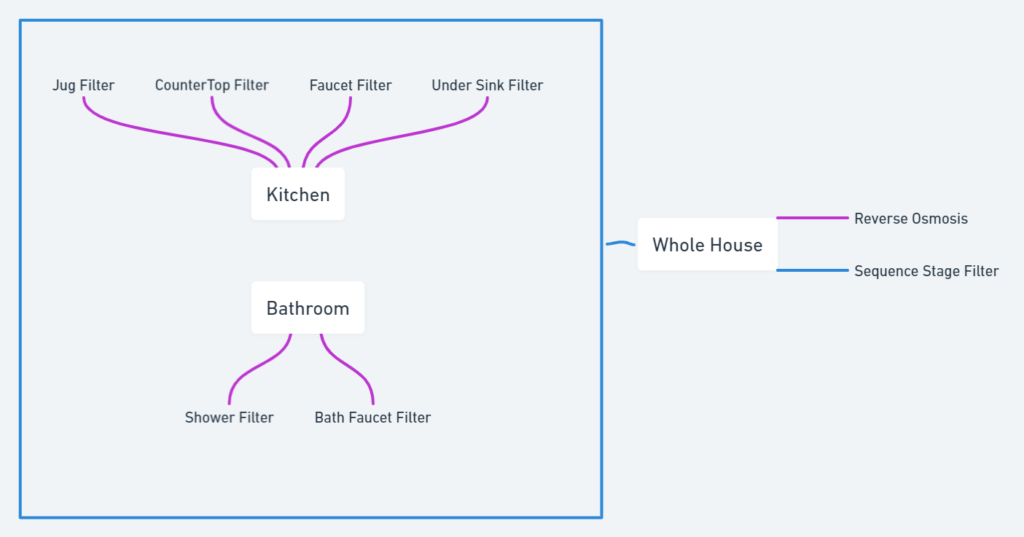
Kitchen Water Filters
Jug Water Filter (Water Pitcher)
Installation: None
Filter Life Average: 3-6 months
Advantages
- Simple operation, fill in the top and let it drip filter through
Disadvantages
- You have to fill it up manually from the top, and wait
- Mold can start to grow around the rim of the container, and needs cleaning monthly (vinegar is fine)
What Type of Filtration Does a Jug Water Filter Use?
Some have 1 to 2 stages or can use activated carbon only which is based. The above pitcher has 4 stages of filtration.
CounterTop Filter
2 Categories:
- Attaches to Faucet Kitchen Tap
- Freestanding – refillable
Faucet Countertop Tap Water Filter

Attached to a standard 1/4″ tap faucet, you have a small lever that either directs the water to the filter or flows normally straight down through your tap faucet.
Installation: Simple, DIY
Filter Life Average: 6-12 months
Advantages
- Simple operation, lever changes flow to the filter system easily
- Easy Filter change
Disadvantages
- Take up your countertop space
Freestanding – Refillable Water Filter (Dispenser)
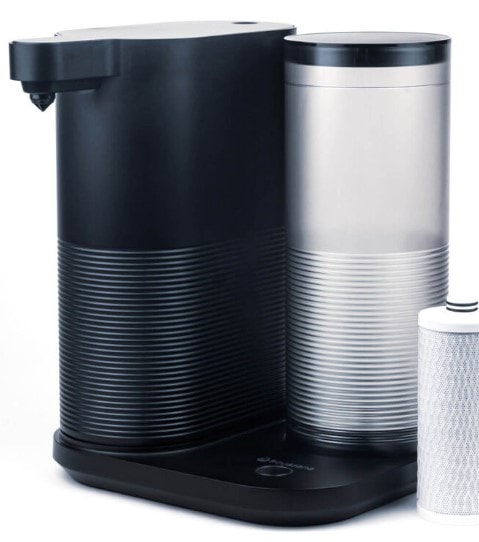
Like a water pitcher, often a more effective filter system. You fill the water into the device and can push the button to pour water.
Installation: None – plug and drink design
Filter Life Average: 6-12 months
Advantages
- Simple operation, kids seem to enjoy this filter more
- Easy Filter change
- Many models chill water
Disadvantages
- Take up your countertop space
- Often requires a power plug
- Has to be topped up with water
These can be either cold water only, or some do instant hot water. Also, you can get some that offer a 176°F/80°C. (These are more of an investment)
Technology varies in terms of filtration.
Faucet Filter (Direct Connect)
This is one of the most popular, you just remove the screw cap on your kitchen tap/faucet. Then, screw on the filter.
There is a lever to turn the filter on or have the normal faucet straight through.
Due to the simplest possible installations, these are often chosen.
Invest in a decent one like this, or else you will get the dreaded dripping when you run the filter.
TIP
You can deal with this using nylon thread plumbing tape to sort out any leaks. Just wrap it a few times around the screw thread before installing the filter!
Under Sink Filter
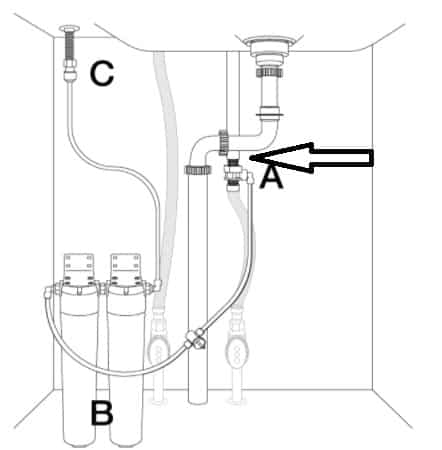
2 Main Types of Under Sink Water Filters:
- Independent Faucet Water Filter
- In-Line Under Sink Water Filter
Independent Faucet Water Filter
For installation, this is definitely a plumber or advanced DIY project. A hole near the sink is needed, and the water filter is installed underneath, in the cupboard.
You do get the choice of styles, like brushed finish chrome, etc. This just depends on if you want another tap dedicated to filtered water!
Depending on your ability, these can often be easily installed. BUT, some of you out there will feel comfortable with a handyman(or woman). A plumber isn’t necessary unless they are also supplying the under-sink filter.
What I have learned over the years, is that a plumber might be great for connecting pipes, but they are not versed in what water filters do and how they work.
In-Line Under Sink Water Filter
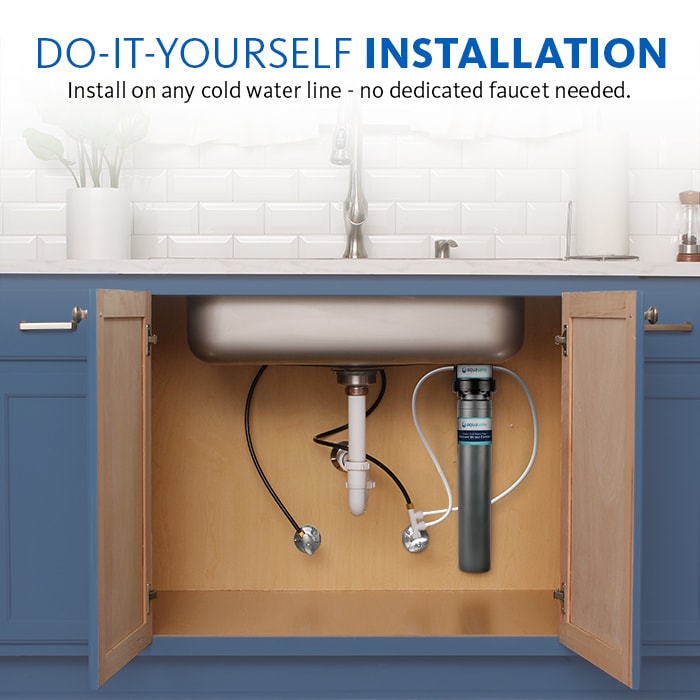
Placing the filter on the cold water pipe under the sink means there is a small plumbing job to put filter on the cold water pipe under the sink. This, in turn, means all cold water (or cold & hot water if it is a 1 tap/faucet) will be filtered.
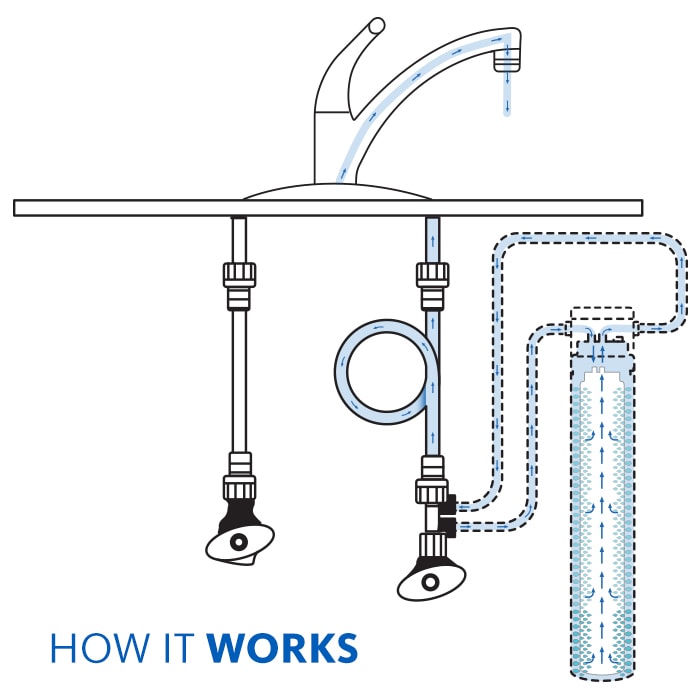
You would need to replace this filter more regularly since you will be filtering all the water.
This comes down to whether you just want filtered water to drink and cook with. Or filtered water for all things in the kitchen.
Bathroom Water Filters
- Shower Filter
- Handheld Shower Filter with Wand
- Bath Ball Filter
Here are some of the main types, directly screwing into the shower fitting in most situations.
They often come in either chrome or white. Click on the image for checking out more detail.

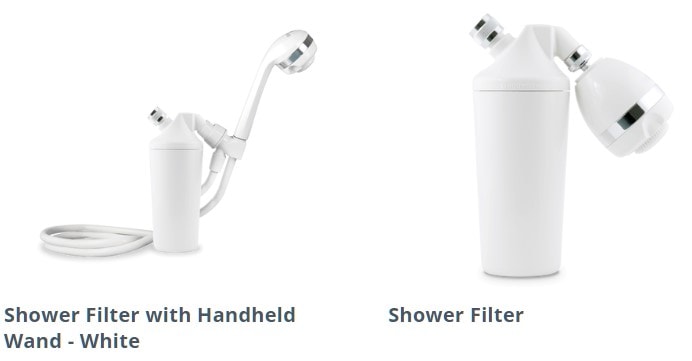
If you wanted to get a permanent inline filter for bath, shower, or bathroom tap – you could of course.
Shower Water Filters
Shower Filter, with an inline filter. I have a reversible one, which is the chrome type below.
The easiest option is for a shower filter that screws onto the head like this:
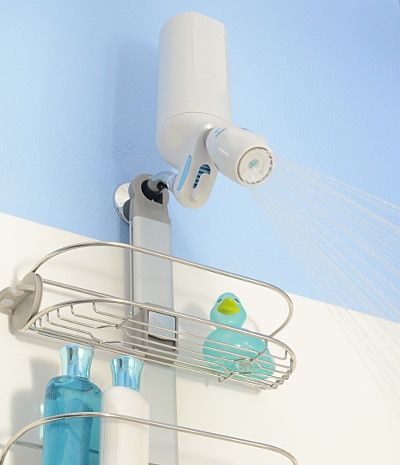
However, it depends on how you’re shower is set up!
Some of these types of shower filters are primarily made to remove chlorine since this is a common request by consumers. Chlorine is not good for the skin, I use a chlorine water filter which is as simple as this at home.
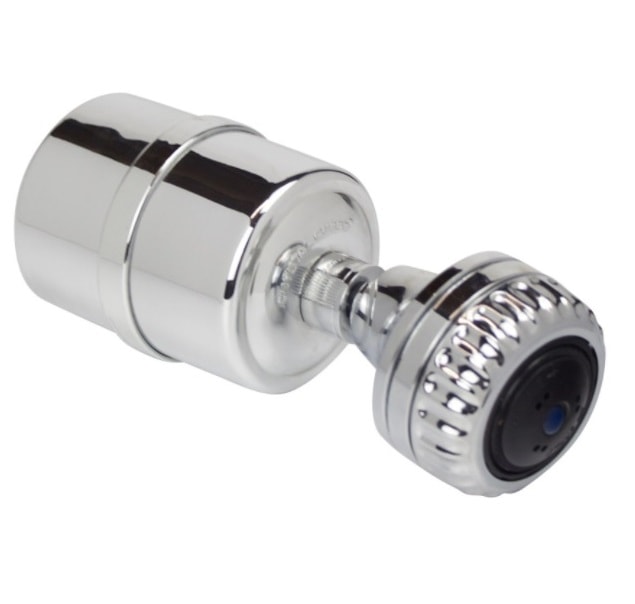
It just screws onto the existing generic screw and is a reversible filter, so I get about 12 months out of the filter – which is excellent!
Handheld Shower Filter with Wand
If you want a shower hose attachment, these offer both a showerhead and shower hose.
Simple solution and relatively cost-effective.
Bath Bucket Filter
Just place it over the bath tap, and it will filter the water whilst filling the bath!
The one pictured above filters (click here or on the picture to go get more info) chlorine, VOCs, THM’s, pesticides, sulfur, heavy metals, hydrogen sulfide (“rotten egg” odor), iron oxides (“rust water”), dirt, sediment, and other odors while balancing pH & de-chlorinating.
It’s designed for soft water (not rich in minerals), which is generally what is supplied in urban environments. For rural hard (mineral rich) water, it maybe comes clogged.
A simple solution that can easily be put away in the cupboard as well.
Whole House Water Filters
Two Main Types:
- Sequence Stage Whole House Filter
- Reverse Osmosis Whole House Filter
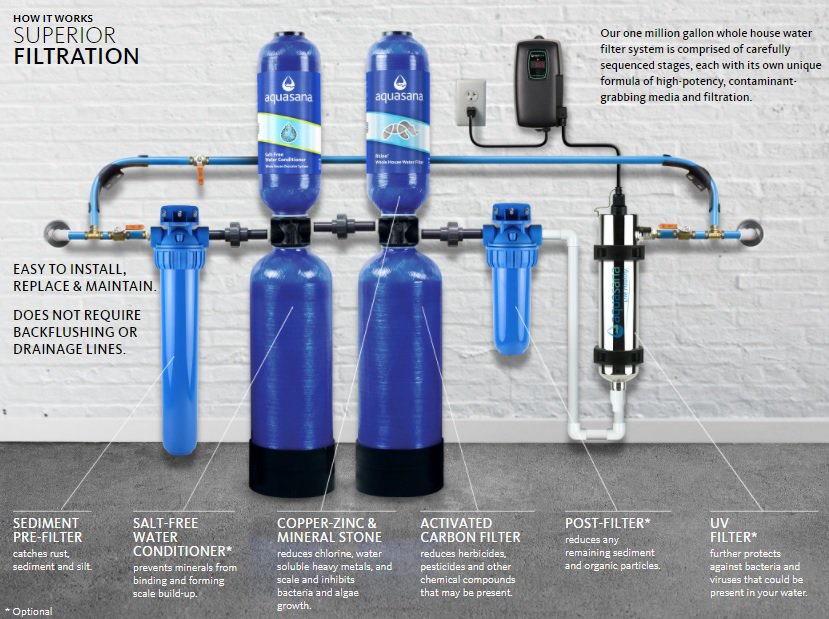
So one of the most important questions is.
Why get a Whole House Water Filter?
Depending on what water quality issues you have, there may or may not be a need for a whole house water filter. The reason why you get a whole house water filter will depend on the supply quality of water at your house.
5 Main Filtration Types and Effects
You may only need one type of filter or all of them depending on the water supply quality.
Here are the common water quality issues and the filters applicable.
Water Quality Issues and Filter Needed
| Water Issue | Filter Needed | Process |
| Chlorine | Carbon Filter | Removal |
| Sand, Clay, Pipe Rust | Sediment Filter | Removal |
| Bacteria, Fungi, Parasites, Virus | Ultraviolet Purification | Disinfects |
| Mineral Rich & Hard Water | Water Softener Filter | Dissolves |
| Acidic Water / Low pH | Acid Neutralizer | Reduction |
More Uncommon filters specifically available are:
- Arsenic Removal
- Flouride Removal
- Lead Removal
- Tannin Removal
- Nitrate Removal
When your house is supplied by a mains water line, the whole house filter is placed at the start, near or adjacent to your house. Therefore, it filters your whole house’s supply of water.
In some instances, if you are being supplied with acidic or sediment-filled water, a whole house filter could potentially protect the pipes and infrastructure of your house from potential damage.
Reverse Osmosis Whole House Filters
Initially designed for submarines (US Navy), it’s an extremely fine filter that takes many of the trace elements and minerals out that humans tend to get some benefits from. So you need to do some research about how contaminated the water is, before looking at this expensive whole-house filtration system.
I strongly would advise talking to a water filter specialist or maybe even two, if you have been thinking about this option. In nearly all situations it’s not needed, and its a large investment, with major ongoing costs for maintenance also.
In general here are some pros and cons for Whole House Filteration
Advantages of Whole House Filtration
- Customized to your scenario
- Possible protection to piping and plumbing
Disadvantages of Whole House Filtration
- Investment Cost
- Professional plumbing needed
- Water pressure may be reduced
- Ongoing maintenance
If you are rural or supplied by bore or well water, it is often hard mineral-rich water, and a whole house softener and sediment filter are likely to be beneficial.
If have a garden or vegetable growing area, filtered water removing chlorine may assist in yields or growth. Some plants like orchids react negatively to chlorinated water. My neighbor captures rainwater for these sensitive types of plants.
Inside plants may also have a preference for rainwater or non-chlorinated water.
TIP
If you want to obtain some of the trace minerals needed as a human, don’t go for reverse osmosis. Reverse Osmosis strips and removes all minerals, not ideal.
Darker Brown showcasing mass fertilizing used on farms, the dots represent a higher concentration of either chlorination byproducts or nitrates. The link below to EWG – Environmental Working Group is below.
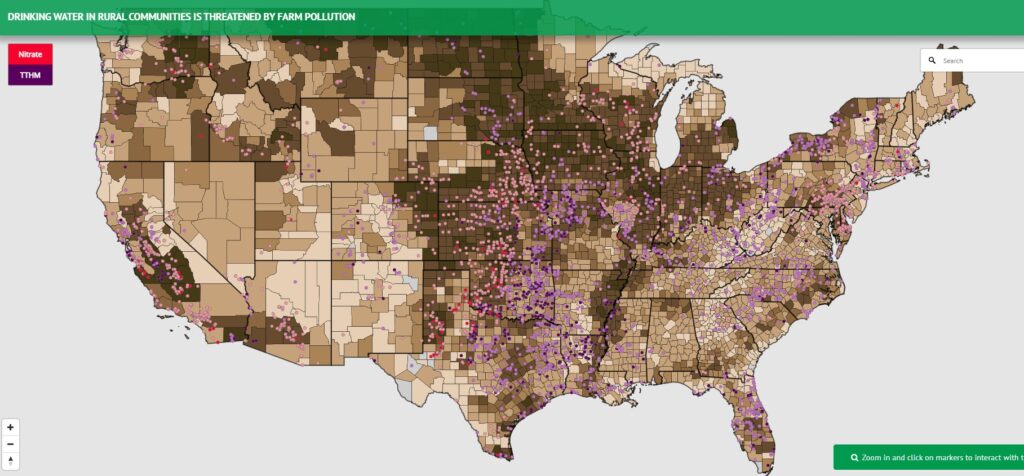
https://www.ewg.org/interactive-maps/troubleinfarmcountry/fertilizer.php
